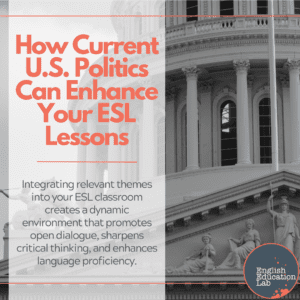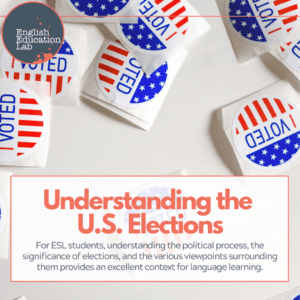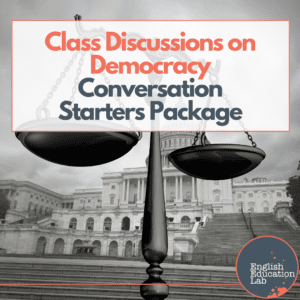
Middle and high school ESL teaching resources inspired by current U.S. political events
In the world of education, the role of English as a second language (ESL) is becoming more significant than ever before. The digital age has made it possible to connect students from diverse backgrounds across the globe, creating opportunities for learning that were previously unimaginable.
For ESL educators teaching middle and high school students, the challenge is to ensure that students not only gain fluency in English but also engage in relevant, thought-provoking discussions that build critical thinking skills. With the current political climate in the United States, teaching ESL students about democracy, politics, and elections provides a unique opportunity for deep engagement and understanding.
This blog post focuses on the most impactful ESL teaching material for middle and high school students, specifically designed to address key political topics related to the U.S. elections, democracy, and politics. By incorporating these relevant themes into your ESL online lessons, you can foster a classroom environment that encourages open discussion, critical thinking, and improved language skills. At the same time, we’ll highlight specific products from English Education Lab that will help you make your lessons even more engaging.
1. Debating topics for middle/high school students: Understanding the U.S. elections
The U.S. presidential elections are a major global event that affects politics worldwide. Debating topics related to the 2024 U.S. elections not only engages students in a current and relevant discussion but also helps them develop their speaking, listening, and critical thinking skills in English.
One product that stands out is Debating Topics for Middle/High School: The 2024 U.S. Elections, available at English Education Lab. This resource provides a variety of debate topics related to the upcoming U.S. elections, allowing students to explore multiple perspectives on issues such as political party platforms, social justice, climate change, and economic policies. By engaging students in structured debates on these topics, you help them practice key language skills like argumentation, persuasion, and public speaking while discussing real-world issues.
In an online ESL classroom, the format of the debate can be easily adapted to suit different learning styles. For instance, you could use Zoom breakout rooms for small-group debates, followed by a larger class discussion. This approach provides students with a platform to express their thoughts in English while learning from others’ perspectives. Additionally, providing students with resources like Debating Topics for Middle/High School: The 2024 U.S. Elections ensures that the debate is well-informed and grounded in current events, helping students develop a deeper understanding of the political system.
2. Class discussions on democracy: Engaging students in meaningful conversations
Democracy is one of the core values that shape U.S. politics, making it an essential concept for ESL students to understand. The political climate in the U.S. is often characterized by debates on the meaning and practice of democracy, including discussions on voting rights, equality, and freedom of speech. In an ESL classroom, these discussions offer a valuable opportunity for students to explore complex topics in English while building their vocabulary and comprehension skills.
Class Discussions on Democracy: Conversation Starters Package from English Education Lab provides an excellent resource for teachers looking to introduce democratic themes in their lessons. This package offers thought-provoking questions and prompts that encourage students to reflect on democracy, both in the U.S. and in their own countries. Topics such as “What does democracy mean to you?” and “How can democracy evolve in the 21st century?” can spark rich discussions, allowing students to practice their speaking skills while learning about an important political concept.
Using these conversation starters in an online ESL lesson can be particularly effective for encouraging student participation. In an online setting, students might feel more comfortable sharing their opinions in smaller groups or using chat features to express their thoughts. By encouraging respectful dialogue and providing a structured framework for these discussions, you can help students improve their language skills while exploring the foundations of democratic principles.
3. Class discussions on politics: Encouraging critical thinking and global perspectives
Politics can be a difficult and sensitive topic, but it is also one that encourages students to think critically about their world. In an ESL classroom, discussing politics offers students a chance to explore issues such as government policies, international relations, and the role of citizens in shaping societal change. The challenge for teachers is to create an environment where students feel comfortable expressing their opinions while learning how to communicate these views in English.
Class Discussions on Politics: Conversation Starters Package, another product available at English Education Lab, offers a comprehensive set of prompts designed to spark conversations on political issues. This package encourages students to think critically about both local and global politics, touching on topics such as political ideologies, social movements, and international conflicts. For example, questions like “What are the challenges of political polarization?” and “How do elections impact citizens’ lives?” prompt students to think deeply about the world around them, while simultaneously improving their English communication skills.
These conversation starters are perfect for ESL online lessons, as they allow students to discuss political themes in a supportive environment. You can assign individual research tasks to prepare for discussions, or use these prompts for live classroom debates, encouraging students to articulate their ideas clearly and confidently in English. This not only boosts language skills but also helps students develop a global perspective on political issues.
4. Incorporating the current U.S. political climate into ESL lessons
The political landscape in the U.S. is constantly evolving, and the current climate offers a wealth of teaching opportunities for ESL educators. From debates over voting rights to the rise of new political movements, these issues provide an excellent context for language lessons that go beyond simple grammar and vocabulary exercises. By incorporating political themes into your ESL online lessons, you can engage students in meaningful discussions while helping them improve their English skills.
One way to approach the current U.S. political climate is to examine the role of young voters in the 2024 U.S. elections. Younger generations are increasingly seen as a powerful force in shaping U.S. politics, with issues like climate change, social justice, and economic inequality driving their political participation. By discussing the influence of young voters, you can encourage students to reflect on the importance of civic engagement and the role they play in shaping the future, both in the U.S. and in their own countries.
Additionally, teaching students about political movements like Black Lives Matter or environmental activism can help them understand how social issues intersect with politics. Through class discussions and debates on these topics, students can explore different perspectives while practicing their English communication skills.
5. Using ESL teaching material to promote critical thinking
Critical thinking is an essential skill for middle and high school ESL students, and discussing political topics is an effective way to nurture this ability. When students engage with complex political themes, they are challenged to analyze information, evaluate arguments, and formulate their own opinions—all while using English. The products mentioned above, such as Debating Topics for Middle/High School: The 2024 U.S. Elections and Class Discussions on Democracy, as well as Debating Topics for Middle/High School: Politics and Government and Democracy Bundle: Class Discussions and Debate provide students with the opportunity to practice these critical thinking skills in a structured and supportive environment.
To get the most out of these materials in your online ESL lessons, encourage students to ask questions, seek clarification, and support their opinions with evidence. By doing so, you’ll not only enhance their English proficiency but also foster a deeper understanding of the political topics they engage with.
6. Final thoughts: Engaging students with online ESL lessons focused on politics
The current political climate in the U.S. offers a rich and relevant context for teaching ESL students. By integrating topics related to the U.S. elections, democracy, and politics into your ESL online lessons, you can provide students with the tools they need to become more engaged global citizens while improving their language skills. The resources available from English Education Lab offer valuable teaching material that can help you create dynamic, interactive, and thought-provoking lessons for your students.
As an ESL teacher, it’s essential to focus not only on language development but also on fostering critical thinking, creativity, and global awareness. By using current political themes in your lessons, you can make your ESL courses more engaging, relevant, and impactful for your students.
If you’re looking to incorporate more engaging and relevant political themes into your lessons, check out English Education Lab’s products. With resources like these, you can ensure that your ESL students are not only mastering English but also becoming informed, critical thinkers in a rapidly changing world.
Visit English Education Lab’s Resource Library to explore more ESL teaching material and resources to enhance your online lessons and engage your students with meaningful content. You can also find all our resources on Teachers Pay Teachers (TPT)!
Struggling to get your ESL students talking? We’ve got you covered! Download our FREE ESL teacher’s survival kit now and transform your ESL lessons into dynamic, student-led conversations!
Subscribe to my YouTube Channel!
Further Reading
Top tips for success in your online English courses: How to stay motivated and organized
Top 5 online tools to use as an ESL learner
The question of time: How long does it take to learn English?
Why you should develop a growth mindset for language learning
Unleashing your potential through learning English as a second language
Mastering English: 5 Essential study habits for ESL students







